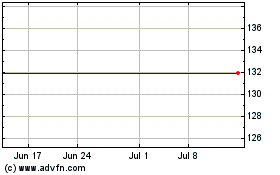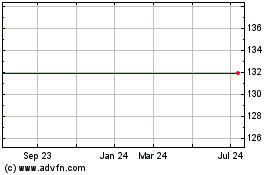Oil-Patch Deal Pays Off Big -- WSJ
January 19 2017 - 3:02AM
Dow Jones News
Investment firm made more than $1 billion in under a year by
aiding Clayton Williams
By Ryan Dezember
Last year, during the depths of the oil-price slump, Los Angeles
investment firm Ares Management LP threw a lifeline to a struggling
Texas crude producer.
Now that Noble Energy Inc. has agreed to pay $2.7 billion for
that company, Clayton Williams Energy Inc., Ares is in line to
triple its money and reap more than $1 billion in profit.
Ares's huge gain is the sort of prize private-equity investors
envisioned when oil prices collapsed in late 2014 and pressured the
U.S. shale drillers that had been financed with $100-a-barrel oil
in mind.
But opportunities have been rare to buy into companies strong
enough to survive but too strained to tap other financing sources,
such as the stock market, that are cheaper and have fewer strings
attached than what firms such as Ares usually offer.
Clayton Williams, named for its octogenarian chairman and chief
executive, was an alluring target. The Midland, Texas, company held
a swath of land in what has emerged as the hottest drilling area in
the U.S. but not much money to develop it, and Clayton Williams was
in danger of tripping debt-to-earnings limits set by its
creditors.
Last March, about a month after oil prices slid to about $26 a
barrel, Ares lent Clayton Williams $350 million, charging 12.5%
with an option to defer interest payments and add more debt for two
years. Ares, which got a pair of board seats in the deal, also
bought warrants to buy more than two million shares.
The cash allowed Clayton Williams to pay down its bank debt and
renegotiate credit agreements to give it breathing room. The timing
was fortuitous, as oil's February low turned out to be the bottom,
and oil prices rose to roughly $50 a barrel, where they have
hovered in recent months. Ares padded its bet by snapping up
another million shares on the open market as the stock languished
at its lowest levels in more than a decade.
In late July, Ares agreed to buy about five million shares from
Clayton Williams for $150 million, gaining another board seat. The
company used the cash to keep drilling in the Delaware Basin, a
part of West Texas' Permian Basin, where prolific wells sparked a
land grab among oil producers and big Wall Street firms.
The firm's enthusiasm for Clayton Williams wasn't shared by many
investors. In mid-July, more than half of the company's publicly
traded shares were held short, in bets that the stock would lose
value, according to SunTrust Robinson Humphrey. Sentiment would
soon shift, however.
The week before Clayton Williams and Ares agreed to the big
stock sale, a blank-check company run by former EOG Resources Inc.
CEO Mark Papa agreed to buy Centennial Resource Development Inc., a
closely held company, in a deal that valued its 42,500 Delaware
Basin acres at about $1.74 billion.
Clayton Williams's 65,000 acres were basically next door. The
move by Mr. Papa, a major figure in the shale business who built
EOG into the largest oil producer in the lower 48 states,
"certainly gave people much more faith in that acreage," says
SunTrust analyst Neal Dingmann.
Clayton Williams's stock rose sharply as oil prices moved higher
and Delaware Basin properties started fetching record highs. By
Monday, when Noble said it would buy the company with a combination
of cash and stock, Clayton Williams's shares had risen to more than
three times the price Ares paid for most of its stake. Noble agreed
to pay a large premium, and a 7.1% pop in its own shares on Tuesday
boosted the return for Ares, which is also due a big prepayment
penalty on the loan.
In all, the roughly $516.6 million Ares invested in Clayton
Williams is currently worth more than $1.7 billion under terms of
the Noble deal, according to securities filings and people familiar
with the matter. About half of that will be paid in cash, while the
rest is represented by what will be a roughly 5% stake in
Houston-based Noble, one of the largest U.S. exploration and
production companies.
"That's what happens in the oil business," Mr. Dingmann said.
"Had the Delaware acreage been a county or two counties over, they
might have gotten half to a quarter of that."
Write to Ryan Dezember at ryan.dezember@wsj.com
(END) Dow Jones Newswires
January 19, 2017 02:47 ET (07:47 GMT)
Copyright (c) 2017 Dow Jones & Company, Inc.
Williams (CLAYTON) Energy, Inc. (NYSE:CWEI)
Historical Stock Chart
From Oct 2024 to Nov 2024

Williams (CLAYTON) Energy, Inc. (NYSE:CWEI)
Historical Stock Chart
From Nov 2023 to Nov 2024
